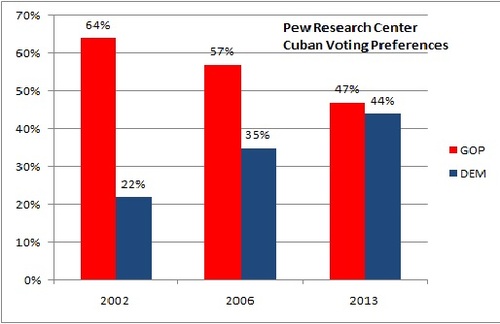When one wonders why the Cuban Embargo was around so long, Floridians used to tell me "It's politics." The same can be said of why the Cuban Embargo is ending.
Cuban-Americans are trending Democratic, and so a Democrat President, Barack Obama, is appealing to this younger generation, which seems to prefer an end to the Cuban Embargo which has been around since the waning days of President Dwight D. Eisenhower's Administration.
It wasn't always this way. Republicans sought to have a Cuban Embargo to punish Fidel Castro for expropriating private property belonging to U.S. businesses. Later, this was expanded to pro-Soviet ties, human rights concerns, and the desire of Castro and Che Guevara to spread the Cuban Revolution throughout Central America, South America and the Caribbean.
Any member of the G.O.P. who differed from this policy could be labeled "soft on Communism." And no Republican candidate for president could dare to suggest ending the Cuban Embargo without the risk of losing this large, early primary state. That's because the Cuban-American community used to be one of the most pro-GOP groups. Now they are split.
Democrats has always been in a quandary about Cuba. President John F. Kennedy refused to invade Cuba to help the Cuban exiles at the Bay of Pigs, and the party earned decades of enmity from Cuban-American exiles as a result. President Jimmy Carter partially lost his presidency due to the Mariel Boatlift. President Bill Clinton sought closer ties, until a plane of Cuban exiles spreading leaflets was shot down. The Elian Gonzalez fiasco didn't help matters. Cuba became a source of Democratic Party pain.
But that's changed, thanks to a younger generation of Cubans. Whether it's because they aren't hearing the horror stories of Castro's "to the wall" firing squads, or because Fidel Castro stepped down in favor of the more moderate Raul Castro (who seems less intimidating), or because they desire peace between the two countries, or because Republican immigration policies turned off all Hispanics in general, it's unclear.
But it is clear that Cuban-Americans are trending toward the Democratic Party. Now they're split between the two parties, a far cry from post-Elian Gonzalez days. As Politico's Hohmann and Cheney write, Obama handily won the younger Cuban-Americans in 2012. They also point out that exit polls in 2014 Democrats narrowly won the Cuban vote, despite GOP Governor Rick Scott having a Cuban-American on the ticket. Moreover, the authors found that a majority of Americans support ending the embargo; for Floridians, it's nearly a 2:1 margin in favor of closer ties with Cuba.
That gave Obama all the political cover he needed to engage in the prisoner swap (with the blessing of Pope Francis) and begin talks on reopening the U.S. Embassy in Havana and ending the decades-old embargo on Cuba.
John A. Tures is a professor of political science at LaGrange College in LaGrange, Ga. He can be reached at jtures@lagrange.edu.

